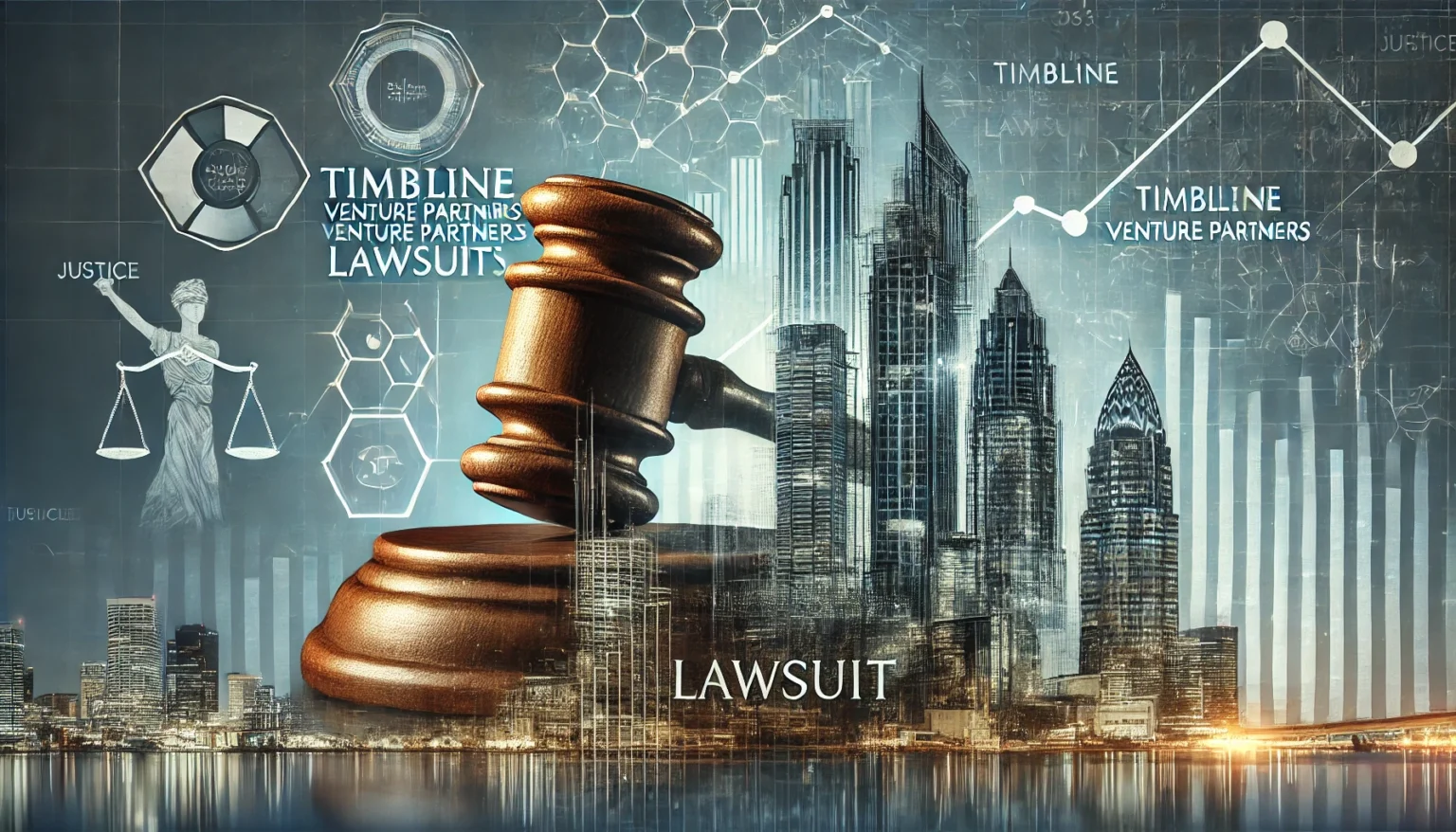As a key player in early-stage investments, Timberline’s legal challenges raise questions about governance and accountability in the industry.
The lawsuit revolves around disputes involving financial dealings and strategic decisions. Allegations suggest potential lapses in due diligence and compliance, putting the firm under intense scrutiny.
This case highlights the complexities of venture capital operations and the risks involved in high-stakes investments. The Timberline Venture Partners lawsuit serves as a reminder of the importance of transparency and legal safeguards in business partnerships.
Key Players and Their Roles in the Dispute
The Timberline Venture Partners lawsuit involves various influential players, each contributing to the dispute’s complexities. Timberline Venture Partners, as the primary defendant, is a venture capital firm accused of mismanagement and breach of fiduciary duty. Their role in handling investment funds and adhering to contractual agreements has come under severe scrutiny.
The plaintiffs in the lawsuit include former investors and some of the firm’s stakeholders, who argue that Timberline’s actions directly resulted in financial losses. These stakeholders claim that the firm failed to uphold its obligations, particularly in terms of transparency and fund allocation.
Portfolio companies associated with Timberline have also raised concerns, suggesting that promised financial support was delayed or insufficient. This has led to operational difficulties for these startups, further intensifying the dispute.
Additionally, both parties have enlisted experienced legal teams to represent them. The attorneys are focusing on evidence such as financial documents, email correspondences, and partnership agreements to build their cases. Regulatory bodies are closely monitoring the lawsuit for its potential to influence future governance standards within the venture capital industry.
The roles of these key players highlight the interconnectedness of the Timberline Venture Partners lawsuit and its potential ramifications for the broader investment landscape.
Timeline of Events Leading to the Timberline Venture Partners Lawsuit
The sequence of events leading to the Timberline Venture Partners lawsuit sheds light on the escalating tensions between the involved parties. Disputes initially emerged in early 2023, when portfolio companies and investors began expressing concerns about delayed funding and discrepancies in financial reporting.
By mid-2023, these concerns escalated, and formal complaints were filed. Stakeholders accused Timberline of breaching contractual obligations and failing to disclose critical information regarding fund allocation. This marked a turning point, as the issue transitioned from internal disagreements to legal action.
In late 2023, the lawsuit was officially filed, with plaintiffs outlining a series of allegations. Preliminary hearings began in early 2024, during which both sides presented key pieces of evidence, including financial audits and communication records.
Efforts at mediation in mid-2024 failed to resolve the conflict, forcing the case to proceed through the courts. As of late 2024, the case remains active, with significant implications for all parties involved.
| Date | Event |
| Early 2023 | Initial disputes over funding emerge |
| Mid-2023 | Formal complaints filed by stakeholders |
| Late 2023 | Lawsuit officially filed |
| Early 2024 | Preliminary court hearings commence |
| Mid-2024 | Mediation attempts fail |
| Late 2024 | The case continues in court |
This timeline underscores the protracted nature of the Timberline Venture Partners lawsuit and the challenges in resolving such high-stakes disputes.
Legal Allegations and Their Basis
The Timberline Venture Partners lawsuit involves a range of allegations rooted in legal and financial claims.
- Breach of Fiduciary Duty: Plaintiffs allege that Timberline failed to act in their best interests, particularly in managing investments.
- Contractual Violations: Accusations include non-compliance with funding agreements and terms outlined in stakeholder contracts.
- Mismanagement of Funds: Financial records presented in court suggest potential misuse or redirection of investment funds.
- Lack of Transparency: Plaintiffs claim that Timberline withheld critical information, making it difficult to assess the firm’s performance.
The legal claims are supported by evidence, including emails, financial statements, and testimonies. These allegations form the foundation of the case and could have widespread implications for industry practices.
Transparency issues have also been highlighted, with plaintiffs claiming that Timberline withheld critical information from stakeholders, preventing them from making informed decisions. Legal experts view these allegations as a potential turning point for accountability in venture capital practices.
The court is expected to analyze these claims in detail, as their outcomes could set significant precedents for how venture capital firms operate and are held accountable in the future.
Potential Outcomes for Stakeholders
The Timberline Venture Partners lawsuit could result in a range of outcomes, each carrying unique implications for the involved parties. For the plaintiffs, a favorable ruling might lead to financial compensation or renegotiation of their agreements with Timberline. Such an outcome would aim to address the alleged financial losses and restore investor confidence.
For Timberline Venture Partners, the stakes are equally high. A ruling against the firm could result in reputational damage, operational restructuring, and increased regulatory scrutiny. This may affect its ability to attract future investments and partnerships.
Portfolio companies linked to Timberline could experience both immediate and long-term impacts. While a ruling in favor of the plaintiffs might restore some resources, the ongoing legal battle has already disrupted operations for some startups, creating challenges in securing additional funding.
The venture capital industry as a whole stands to be influenced by this lawsuit. If the court imposes strict penalties or mandates new governance practices, other firms may adopt more transparent and compliant operational strategies to avoid similar disputes.
Regulatory bodies are also closely watching the case. A precedent-setting outcome could lead to tighter regulations and oversight, ensuring greater accountability across the industry. The resolution of the Timberline Venture Partners lawsuit will undoubtedly shape the future of venture capital governance.
How This Lawsuit Could Impact Venture Capital Practices
Venture capital firms may prioritize stronger governance frameworks to avoid similar legal challenges. This could include enhanced oversight of fund allocation and stricter compliance with investment agreements.
Regulatory bodies might respond by introducing new guidelines for venture capital operations. These rules could mandate regular audits and standardized reporting practices, ensuring greater accountability across the industry.
Investor expectations are likely to shift as well. More stakeholders might demand active involvement in the management and oversight of their investments. This could lead to a reduction in passive investing and an increase in co-management models.
The case may also push for better contractual clarity. Firms might need to refine investment agreements, clearly outlining the responsibilities and obligations of all parties to minimize the potential for disputes.
| Potential Changes | Impact on Venture Capital |
| Stronger Governance | Reduced risk of mismanagement |
| Regulatory Guidelines | Increased accountability and compliance |
| Shift in Investor Expectations | More active stakeholder participation |
| Clearer Contracts | Fewer disputes and misunderstandings |
These changes illustrate how the Timberline Venture Partners lawsuit could reshape the industry, fostering a more transparent and accountable venture capital ecosystem.
Financial and Reputational Risks Involved
The Timberline Venture Partners lawsuit presents both financial and reputational challenges for the involved parties. If Timberline is found liable, the financial repercussions could include significant compensation payouts. These costs might impact the firm’s ability to fund future ventures and support existing portfolio companies.
Reputation is another area of concern. Allegations of mismanagement have already damaged Timberline’s image among investors. Even if the firm wins the case, the negative publicity could discourage future partnerships.
- Major Risks Identified:
- Financial: Compensation payouts and disrupted cash flows.
- Reputational: Loss of trust among current and potential investors.
- Operational: Challenges for portfolio companies relying on Timberline’s funding.
For portfolio companies, funding delays caused by the lawsuit have led to operational setbacks. This highlights the interconnected nature of venture capital and how disputes can affect the broader ecosystem.
Lessons for Investors from the Timberline Venture Partners Lawsuit
The Timberline Venture Partners lawsuit provides critical lessons for investors seeking to navigate the complex world of venture capital. One key takeaway is the importance of thorough due diligence. Investors should carefully evaluate a firm’s track record, governance policies, and transparency before committing funds.
Another lesson is the value of clear contractual agreements. Ambiguities in contracts can lead to disputes, as seen in this case. Investors should work with legal experts to ensure agreements clearly define responsibilities and expectations for all parties.
Regular monitoring and communication are also crucial. Investors should stay actively involved in tracking the progress of their investments and request detailed updates from fund managers.
The lawsuit also underscores the risks associated with passive investment strategies. Investors who delegate all decision-making authority to venture capital firms may expose themselves to unexpected challenges.
Ultimately, the Timberline Venture Partners lawsuit highlights the need for investors to be proactive, informed, and engaged in their investment strategies to minimize risks and maximize returns.
Broader Implications for the Startup Ecosystem
The Timberline Venture Partners lawsuit could have lasting effects on the startup ecosystem. Startups may face increased scrutiny from venture capital firms, especially regarding their governance and financial practices. This could result in longer funding cycles as investors prioritize companies with well-documented structures.
Transparency and communication will become even more critical. Startups that actively share progress updates and financial reports with their investors are more likely to build trust and avoid conflicts.
- Key Changes for Startups:
- Enhanced financial reporting to build investor confidence.
- Clearer alignment of goals with venture capital partners.
- Exploring alternative funding sources, such as crowdfunding.
The case might also inspire startups to explore alternative funding models. Options like revenue-based financing or crowdfunding could become more popular as startups seek to reduce their dependence on traditional venture capital.
In the long run, the Timberline Venture Partners lawsuit could lead to a more resilient startup ecosystem, with stronger collaboration between founders and investors.
Regulatory and Legal Challenges in Venture Capital
The Timberline Venture Partners lawsuit highlights the regulatory and legal challenges inherent in the venture capital industry. As firms navigate complex investment structures, the lack of uniform regulations can lead to inconsistencies in governance and accountability.
One major challenge is the absence of standardized contracts and compliance requirements. Venture capital agreements often vary widely, leaving room for disputes when terms are unclear or misinterpreted. This case underscores the need for clearer and more enforceable contracts.
Regulatory oversight in venture capital is minimal compared to other financial sectors. Firms may face increased scrutiny as regulators consider implementing stricter measures to prevent similar legal conflicts. Potential regulations could include mandatory financial audits and enhanced reporting requirements.
- Key Challenges:
- Lack of standardized legal frameworks.
- Limited regulatory oversight.
- Complexities in cross-border investments.
The lawsuit also brings attention to cross-border investments, where differing legal standards can complicate enforcement. This issue could prompt international cooperation to create consistent legal guidelines for venture capital operations.
As the Timberline Venture Partners lawsuit unfolds, it serves as a catalyst for discussions about reforming regulatory and legal frameworks to ensure greater accountability and transparency in the industry.
Steps Timberline May Take Post-Lawsuit
In the aftermath of the Timberline Venture Partners lawsuit, the firm is likely to implement a range of measures to rebuild its reputation and restore stakeholder confidence. One of the immediate steps may involve revising internal governance practices to ensure better oversight of fund management and compliance.
Timberline may also introduce more transparent reporting mechanisms, providing stakeholders with regular updates on financial performance and investment decisions. This could help rebuild trust with current and future investors.
Another potential step is settling disputes with affected parties. Reaching amicable agreements could minimize financial losses and expedite the resolution process. This approach might also prevent prolonged legal battles.
- Possible Post-Lawsuit Actions:
- Enhance governance frameworks to prevent future disputes.
- Introduce transparency initiatives, including detailed financial reporting.
- Settle disputes to avoid prolonged litigation and reputational harm.
The firm may also focus on rebuilding its public image through strategic communication efforts. Highlighting successful investments and emphasizing positive changes could help counter the negative publicity surrounding the lawsuit.
Long term, Timberline is likely to adopt a more cautious approach to investments, prioritizing risk management and compliance to avoid similar challenges in the future.
Expert Analysis of the Case and Its Implications
Experts analyzing the Timberline Venture Partners lawsuit emphasize its potential to reshape the venture capital landscape. Legal analysts point to the allegations of fiduciary breaches and mismanagement as critical issues that could redefine governance practices across the sector.
Financial experts suggest that the lawsuit could deter investors from engaging with firms lacking strong transparency and accountability measures. This could lead to a shift in investor behavior, with more emphasis on due diligence and active involvement in fund management.
Regulatory specialists view the case as a wake-up call for authorities to implement stricter oversight. They predict that increased regulation will help prevent similar disputes but could also raise operational costs for venture capital firms.
| Expert Perspective | Implication |
| Legal Analysts | Emphasize need for stronger fiduciary practices. |
| Financial Experts | Predict changes in investor behavior. |
| Regulatory Specialists | Advocate for enhanced oversight and compliance. |
Industry commentators also highlight the reputational damage caused by the lawsuit. Firms involved in similar disputes may face difficulties attracting new investments, underscoring the importance of maintaining ethical and transparent practices.
The Timberline Venture Partners lawsuit is widely seen as a pivotal case that could drive significant changes in how venture capital firms operate and interact with stakeholders.
Future Outlook for Venture Capital Firms Facing Legal Challenges
The Timberline Venture Partners lawsuit sets a precedent for how legal challenges can shape the future of venture capital firms. Companies in the sector may adopt proactive measures to mitigate risks, such as investing in legal expertise and improving contractual clarity.
Increased regulatory scrutiny is expected to be a major factor in the industry’s evolution. Firms may need to comply with stricter reporting standards and undergo regular audits, adding to operational costs but improving investor confidence.
Investor expectations are likely to shift, with stakeholders demanding more transparency and involvement. This could lead to the rise of co-investment models where investors have greater influence over decision-making.
| Trend | Impact on Firms |
| Stricter Regulations | Higher compliance costs but improved accountability. |
| Shift in Investor Expectations | More demand for transparency and involvement. |
| Focus on Risk Management | Enhanced due diligence and governance practices. |
The lawsuit may also inspire innovation in venture capital funding models. Alternative financing methods, such as revenue-based financing, could gain popularity as firms explore ways to reduce dependency on traditional venture capital structures.
Ultimately, the Timberline Venture Partners lawsuit will likely lead to a more cautious and regulated industry, with an emphasis on accountability, transparency, and risk management.
Conclusion
The Timberline Venture Partners lawsuit highlights critical challenges in the venture capital industry, from governance issues to regulatory gaps. This case has underscored the importance of transparency, accountability, and strong legal frameworks in managing investments and fostering trust among stakeholders.
For venture capital firms, the lawsuit serves as a wake-up call to prioritize compliance and risk management. Enhanced reporting mechanisms, clearer contracts, and stricter adherence to fiduciary duties will likely become standard practices moving forward. These changes aim to restore confidence and ensure sustainable industry growth.
While investors are reminded of the need for proactive involvement and due diligence, startups are encouraged to adopt better governance practices to align with their funding partners.
As the Timberline Venture Partners lawsuit continues to shape discussions, it is evident that its implications will extend beyond the parties directly involved. The case stands as a pivotal moment, prompting necessary reforms that could redefine the future of venture capital.




